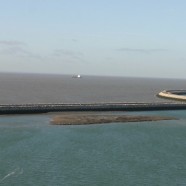Optic 2000
A sacred union made Port 2000, the plural left and the singular right with the assistance of the President of the Republic – who proclaimed in September of 1995 that Port 2000 is “a project of national economic importance and major political interest” – and to the communist Minister of Transportation, the inexhaustible Mr. Gayssot who will not cease to carry budgetary additions on each of his visits to Porte Océane. Only SOS Estuaire and Robin des Bois have grappled with this machine.
The full extent of the risks
Port 2000 will manipulate and stockpile all classes of hazardous materials. The CIM area encompasses 100 meters in the back of the container parks. CIM (Industrial and Maritime Company) has the capacity to stock 5 million tons of oil and is subject to the Seveso directive. To reduce the domino effect between the two installations, in case of industrial accidents, it did not bode well during the initial stages of the project. Then the idea for a slope – measuring 1 to 2 meters long, 60 meters wide at the base, and 17 meters high – was introduced. Experts and third-experts considered it the surest solution concerning the reduction of missile effects and the confinement of toxic and thermal flows. This option would have reduced the availability of container parks by 20%; consequently, this precaution was deemed “unacceptable in regards to the public investment made in other respects to the maritime infrastructure.” The work was surrendered for the profit from two container stacks separated by a corridor measuring 46 meters and functioning as an internal passageway. It was advised that these screen walls be composed of four levels of containers; but the final product consists of only three containers. The structure’s ability to prevent risks is weakened. Example: “Unlike a wall consisting of four containers, a wall of merely three containers does not allow for the containment of zone Z1 (lethal, NDLR) resulting in the escape of chlorinate.” CIM, under pressure from DRIRE (Regional office of Industry, Research, and Environment), dismantled a holding tank of 150,000 tons encrusted in the area of Port 2000. In exchange, CIM negotiated with Port Autonome the prolongation of the concession that expires in 2019.
Optic 2000
A sacred union made Port 2000, the plural left and the singular right with the assistance of the President of the Republic – who proclaimed in September of 1995 that Port 2000 is “a project of national economic importance and major political interest” – and to the communist Minister of Transportation, the inexhaustible Mr. Gayssot who will not cease to carry budgetary additions on each of his visits to Porte Océane. Only SOS Estuaire and Robin des Bois have grappled with this machine.
The full extent of the risks
Port 2000 will manipulate and stockpile all classes of hazardous materials. The CIM area encompasses 100 meters in the back of the container parks. CIM (Industrial and Maritime Company) has the capacity to stock 5 million tons of oil and is subject to the Seveso directive. To reduce the domino effect between the two installations, in case of industrial accidents, it did not bode well during the initial stages of the project. Then the idea for a slope – measuring 1 to 2 meters long, 60 meters wide at the base, and 17 meters high – was introduced. Experts and third-experts considered it the surest solution concerning the reduction of missile effects and the confinement of toxic and thermal flows. This option would have reduced the availability of container parks by 20%; consequently, this precaution was deemed “unacceptable in regards to the public investment made in other respects to the maritime infrastructure.” The work was surrendered for the profit from two container stacks separated by a corridor measuring 46 meters and functioning as an internal passageway. It was advised that these screen walls be composed of four levels of containers; but the final product consists of only three containers. The structure’s ability to prevent risks is weakened. Example: “Unlike a wall consisting of four containers, a wall of merely three containers does not allow for the containment of zone Z1 (lethal, NDLR) resulting in the escape of chlorinate.” CIM, under pressure from DRIRE (Regional office of Industry, Research, and Environment), dismantled a holding tank of 150,000 tons encrusted in the area of Port 2000. In exchange, CIM negotiated with Port Autonome the prolongation of the concession that expires in 2019.









